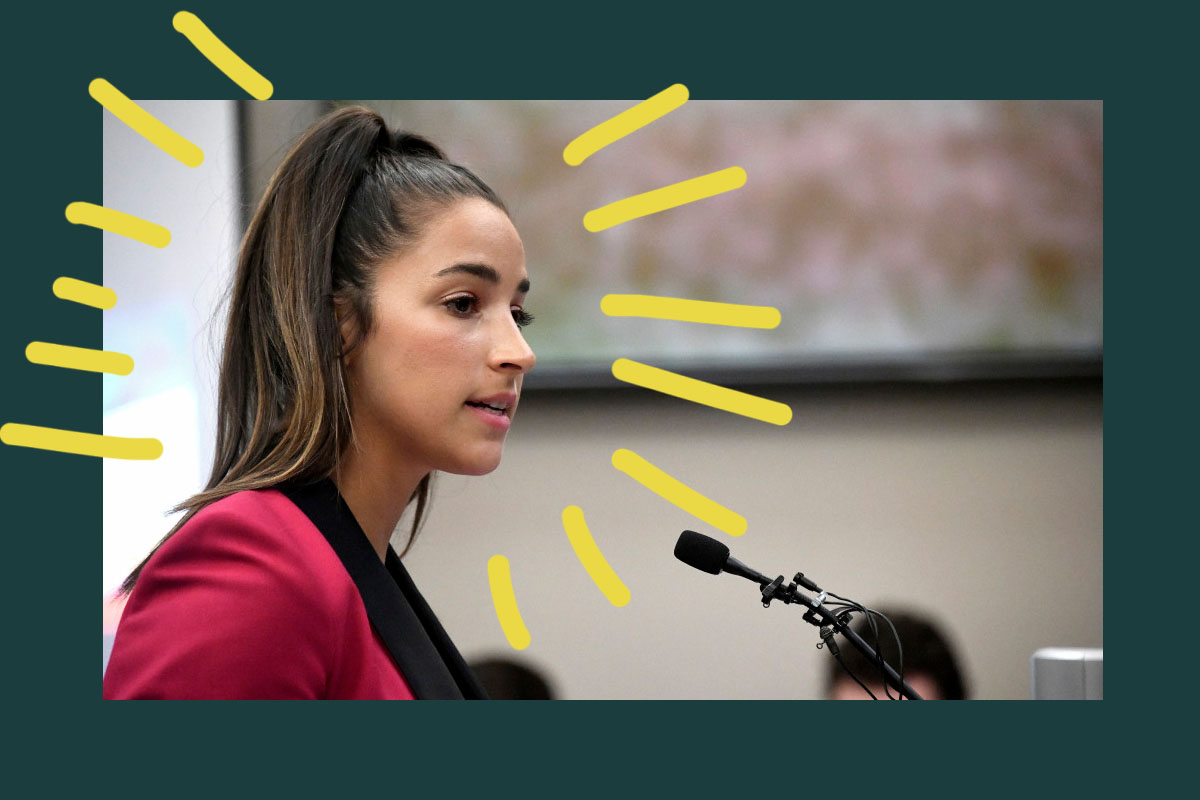I’ll admit a bias: I love Aly Raisman’s gymnastics. Her London 2012 floor exercise routine set to the tune of “Hava Nagilah,” for which she won the second of her three gold medals, brought tears to my eyes. Her individual all-around competition redemption at the 2016 Rio de Janeiro Games schepped so much nachas that you couldn’t help but root for her.
But more important than her athletic accomplishments is her organizing for women’s rights and sexual abuse awareness and prevention education. Like other Olympians, Raisman has competed on Dancing with the Stars, visited the White House, and donned the pages of Sports Illustrated, but unlike others seeking the spotlight, she always puts her money where her mouth is and uses her platform for good.
In the fall of 2017, Raisman came forward as a survivor of sexual abuse at the hands of Larry Nassar, a former doctor who worked for USAG and Michigan State University. Nassar abused more than 250 women and children for over two decades, and many survivors have alleged that both USAG and MSU failed to act on reports of his abuse for years.
Last January, Raisman and many other survivors delivered victim impact statements at one of Nassar’s trials, assuring him that those he had hurt “are now a force and you are nothing.” Nassar will spend the rest of his life in prison, but Raisman is committed to ensuring that his legacy does not allow for any further abuse in sports.
Raisman has partnered with Darkness to Light, a non-profit that offers courses on sexual abuse recognition and prevention. She waived the fees to allow people all over the country to access their introductory course, and signed certificates of completion to incentivize even more education. She modeled a swimsuit for Aerie emblazoned with the word “survivor” and made sure that part of the proceeds would go to Darkness to Light. She has worked with senators from both political parties to promote sexual abuse prevention legislation, appearing at press conferences with her sister survivors. She dedicated a chapter of her 2017 memoir to a non-graphic account of her abuse, with language that empowered both children and adults to talk about sexual abuse recognition.
In short, Raisman has harnessed the most difficult of situations and used her pain to make a tangible change in our nation. Even on the days when she may not feel strong, when the stress of discussing her abuse may be overwhelming, Raisman is a Jewish heroine.
In fact, she reminds me of another Jewish heroine, one I learned about way back when I first heard the Purim story: Queen Esther. Like Esther, Raisman found herself in conditions that threatened the survival and well-being of herself and her community. And like Esther, Raisman has used those experiences to rally others in the name of justice, taking the charge of “tzedek, tzedek tirdof” (“Justice, justice you shall pursue”) to heart. She has inspired other gymnasts to come forward and supported them in their journeys. She has distributed her phone number to current National Team gymnasts, encouraging them to reach out to her with questions or concerns. And she has made sure USAG and the United States Olympic Committee (USOC) knows that she will not rest until everyone who protected Nassar is held accountable and policy changes are implemented to prevent future abuse.
We do not know where USAG will be by the next Olympics, or even next month. Last week, the IndyStar reported that an Indianapolis police detective protected USAG after becoming aware of abuse complaints, and the USOC took beginning steps to decertify USAG as the national governing body of gymnastics (though some claim that the move is to protect the USOC from further liability). If you follow gymnastics news, you may feel like there is a new development in this story every day, and it doesn’t always look good.
The only thing I can say for certain is that whatever happens next, Aly Raisman will be there as a guiding light for all survivors and their allies, an embodiment of the values our traditions teach us to champion.



